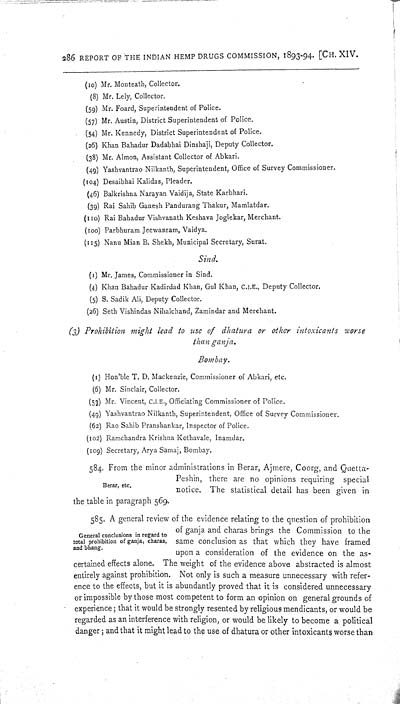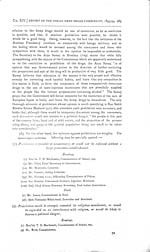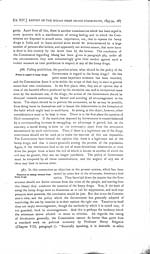Medicine - Drugs > Report of the Indian Hemp Drugs Commission, 1894-1895 > Volume I
(320) Page 286
Download files
Individual page:
Thumbnail gallery: Grid view | List view

286 REPORT OF THE INDIAN HEMP DRUGS COMMISSION, 1893-94. [CH. XIV.
(10) Mr. Monteath, Collector.
(8) Mr. Lely,
Collector.
(59) Mr. Foard, Superintendent of Police.
(57) Mr. Austin, District Superintendent of Police.
(54) Mr. Kennedy, District Superintendent of Police.
(26) Khan Bahadur Dadabhai Dinshaji, Deputy Collector.
(38) Mr. Almon,
Assistant Collector of Abkari.
(49) Yashvantrao Nilkanth,
Superintendent, Office of Survey Commissioner.
(104) Desaibhai Kalidas, Pleader.
(46) Balkrishna Narayan Vaidija, State Karbhari.
(39) Rai Sahib Ganesh
Pandurang Thakur, Mamlatdar.
(110) Rai Bahadur Vishvanath Keshava Joglekar, Merchant.
(100) Parbhuram Jeewanram, Vaidya.
(115) Nanu Mian B. Shekh,
Municipal Secretary, Surat.
Sind.
(1) Mr. James,
Commissioner in Sind.
(4) Khan Bahadur
Kadirdad Khan, Gul Khan, C.I.E., Deputy Collector.
(5) S. Sadik
Ali, Deputy Collector.
(26) Seth Vishindas
Nihalchand, Zamindar and Merchant.
(3) Prohibition might
lead to use of dhatura or other intoxicants worse
than
ganja.
Bombay.
(1) Hon'ble T. D.
Mackenzie, Commissioner of Abkari, etc.
(6) Mr. Sinclair, Collector.
(53) Mr. Vincent, C.I.E.,
Officiating Commissioner of Police.
(49) Yashvantrao Nilkanth, Superintendent, Office of Survey
Commissioner.
(62) Rao Sahib Pranshankar, Inspector of Police.
(102) Ramchandra Krishna Kothavale, Inamdar.
(109) Secretary, Arya Samaj, Bombay.
Berar, etc.
584. From the minor
administrations in Berar, Ajmere, Coorg, and Quetta-
Peshin, there are no
opinions requiring special
notice. The statistical detail has been given in
the table in paragraph 569.
General conclusions in
regard to
total prohibition of ganja, charas,
and bhang.
585. A general review of
the evidence relating to the question of prohibition
of ganja and charas brings
the Commission to the
same conclusion as that which they have framed
upon a consideration of the evidence on the as-
certained effects alone. The weight of the evidence above
abstracted is almost
entirely against prohibition. Not only is such a measure
unnecessary with refer-
ence to the effects, but it is abundantly proved that it is
considered unnecessary
or impossible by those most competent to form an opinion on general
grounds of
experience; that it would be strongly resented by religious
mendicants, or would be
regarded as an interference with religion, or would be likely to
become a political
danger; and that it might lead to the use of dhatura or other
intoxicants worse than
Set display mode to: Large image | Zoom image | Transcription
Images and transcriptions on this page, including medium image downloads, may be used under the Creative Commons Attribution 4.0 International Licence unless otherwise stated. ![]()
| India Papers > Medicine - Drugs > Report of the Indian Hemp Drugs Commission, 1894-1895 > Volume I > (320) Page 286 |
|---|
| Permanent URL | https://digital.nls.uk/74574706 |
|---|---|
| Description | Chapter XIV, cont. |
| Description | [Volume 1]: Report. |
|---|---|
| Attribution and copyright: |
|




